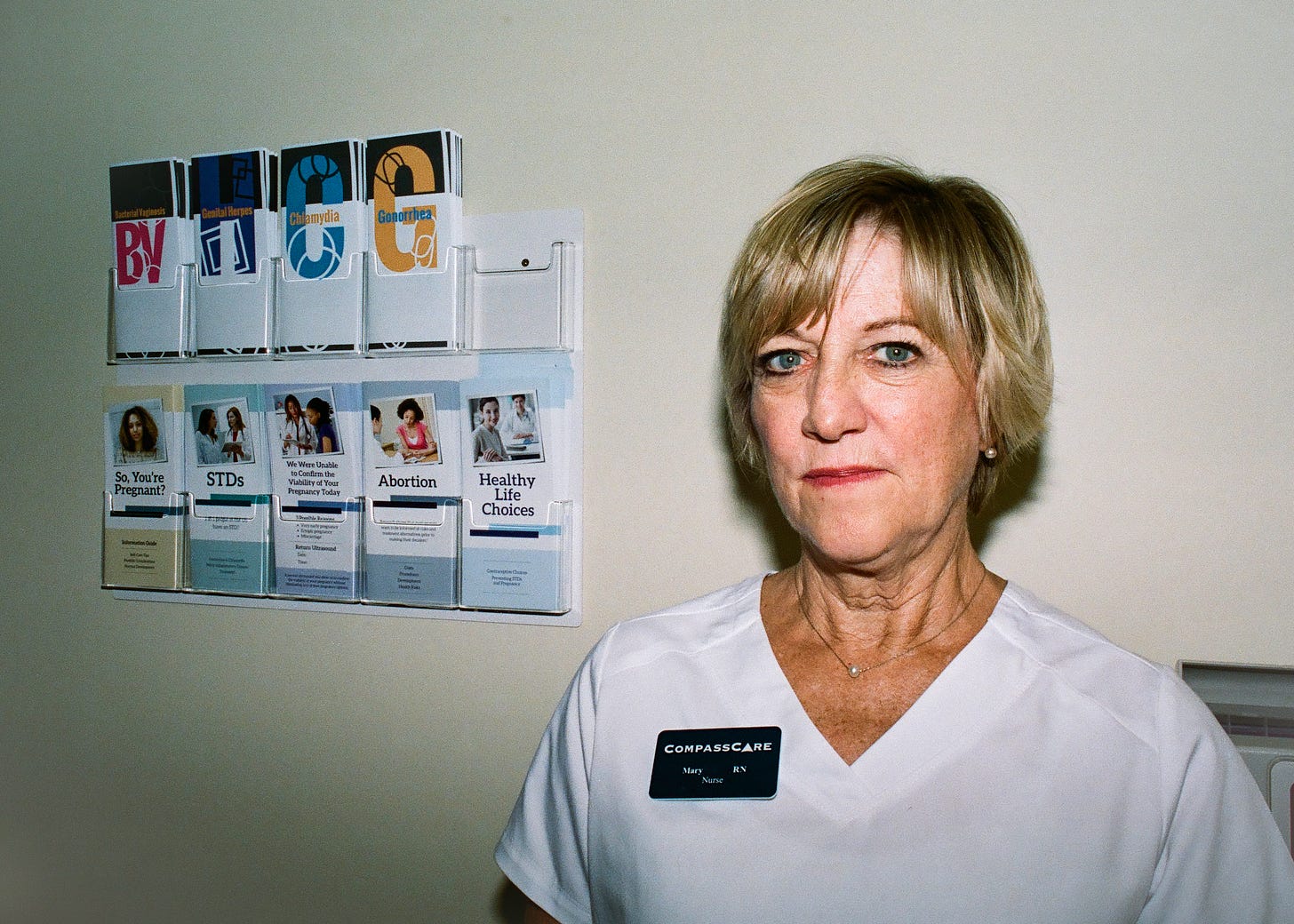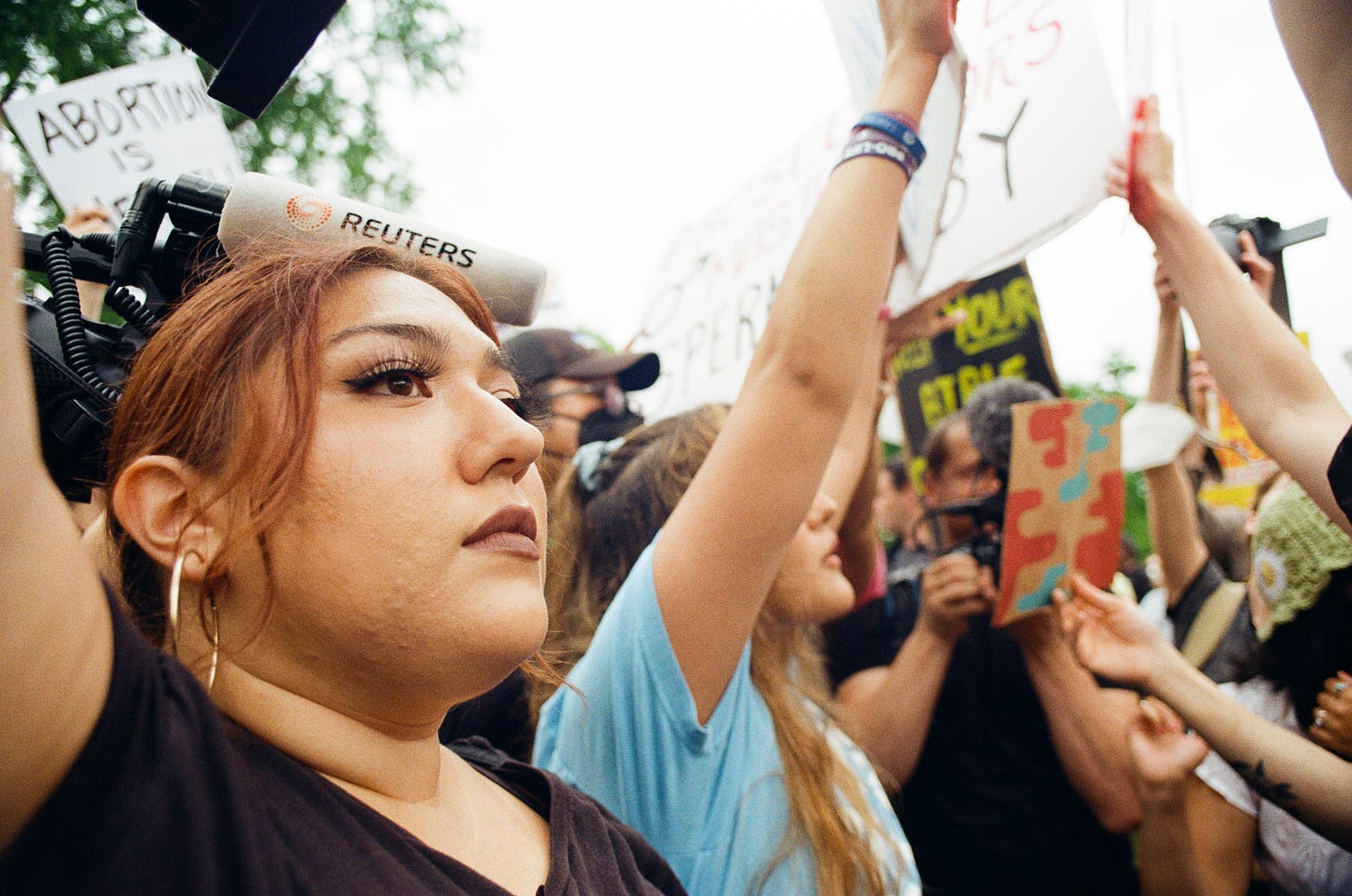A few months ago, I got an email from a young journalist I’d never met named Olivia Reingold. She was based in D.C., and she had reported on Puerto Rican politics for Politico and federal opioid policy for NPR, and now she was executive producing Matthew Yglesias’s new podcast, “Bad Takes.” What struck me about her was that she was most excited about doing old-fashioned journalism: going to rallies and hearings, willing to get on a bus or a plane to get to the bottom of a story.
Fast-forward to this fall. In the aftermath of the repeal of Roe, I kept seeing anecdotes on the fringes of the internet about pro-life centers getting attacked. But it was a story that was almost entirely absent from the mainstream press. I reached out to Olivia to see if she knew anything about it. Next thing I knew, she was on her way to Buffalo.
— BW
On a Sunday morning in May, Wisconsin Family Action, a pro-life group housed in a brick building in a suburb of the state capital of Madison, was fire-bombed.
Windows were blown out. Furniture was destroyed. Someone spray-painted, in neat, girly handwriting: “if abortions aren’t safe, then you aren’t either.”
When she saw federal agents carting buckets of evidence out of the building, hours later, Julianne Appling, Wisconsin Family Action’s executive director, figured that someone would be arrested, indicted, prosecuted—that justice would be served.
That was Mother’s Day, the first weekend after the Dobbs leak, the Supreme Court decision that would overturn Roe v. Wade and throw the question of abortion back to the states. While tens of thousands of Americans across the country were protesting the impending decision, Wisconsin Family Action was burning. (Just days before, 1,000 or so people had demonstrated less than five miles away, in front of the state capitol.) The attack on Wisconsin Family Action was one of many attacks on pro-life facilities that weekend.
It’s been almost five months, and Appling says she still has no idea who blew up the facility—which is fighting to remove all exemptions from Wisconsin’s recently implemented abortion ban.
“When there’s this level of inaction with the investigation, you start asking questions,” Appling told me. “Is it who we are and what we believe?”

For almost as long as abortion was a federally protected right, both sides of the issue imagined themselves taking part in a life and death struggle. Pro-lifers saw themselves resisting what they sometimes called the American Holocaust. Pro-choice activists viewed themselves as protecting women’s right not only to choose whether to abort a fetus, but to be fully independent and equal.
Over the decades, there was lots of violence. And it was directed squarely at abortion providers.
At least 11 people were killed over the years—including doctors, receptionists and other volunteers. In 2009, a pro-life zealot murdered abortion provider George Tiller in the entrance of his church in Wichita, Kansas. A few years later, a gunman, describing himself as a “warrior for the babies,” killed three people at a Planned Parenthood in Colorado Springs.
There have also been kidnappings, other physical attacks, and all species of harassment. The first known arson attack was in 1977, at a Planned Parenthood office in St. Paul, Minnesota; that caused $250,000 in damage and forced the clinic to shut down for six months. Since then, there have been at least 185 other arson attacks, according to the National Abortion Federation.
Abortion providers, especially in more conservative climes, often wore bullet-proof vests, installed bullet-proof glass in their offices and homes, and hired security guards. Pro-choice activists say the latest data shows that the number of incidents, especially stalking and assault, is rising.
Now, some pro-choice extremists are embracing tactics long used against their side.
There have been 74 attacks against anti-abortion organizations since the Dobbs leak, according to Catholic Vote, a lobbying group that supports conservative causes.
That figure comports with a leaked June 24 Homeland Security memo, which predicts “violence could occur for weeks following the release [of the Supreme Court decision], particularly as DVEs”—Domestic Violent Extremists—“may be mobilized to respond to changes in state laws and ballot measures on abortion stemming from the decision.”
The attacks have been against openly pro-life groups like Appling’s, but more often the violence is directed against so-called crisis pregnancy centers, which often pose as clinics providing medical services but, in fact, exist in order to deter women from getting abortions.
Mobs of masked vandals have smashed windows, and plastered buildings with messages like “fake clinic” and “liars.” Activists have interrupted church services. Someone hurled two explosives at an Oregon Right to Life office, in Salem.
Yet so far, there has been not a single arrest, according to pro-life activists who have been following the attacks.
When I asked an FBI spokesperson about this, the bureau sent me the same statement that appeared in a September 7 Christian Broadcasting Network story and subsequently appeared in a handful of other conservative platforms looking into the attacks on pro-life facilities. (Apparently, there have been no developments at the FBI in the past five weeks.) The statement offers few details and does not confirm whether the bureau has made any arrests.
All of this had gone mostly unnoticed outside evangelical circles. Pro-life advocates interviewed for this story knew about the attacks. Pro-choice activists did not.
That includes Katey Zeh, a Baptist minister who sits on Planned Parenthood’s Clergy Board, in Washington, D.C. Zeh condemned the attacks on pro-life facilities but noted that the attacks have not led to any bloodshed. “I think of violence as bodily harm,” she said.

In the Age of Roe, it was not uncommon for Republicans to condemn violence directed at a hostile political faction like the pro-choice movement.
In 2015, when a Planned Parenthood clinic was attacked, it wasn’t just President Barack Obama who expressed outrage, but former Arkansas Governor Mike Huckabee, who had campaigned on adding a constitutional amendment defining personhood at conception. “There’s no excuse for killing other people,” Huckabee said. He called the attack “domestic terrorism.”
Florida Governor Jeb Bush, in 2003, said he wouldn’t be “bullied” into stopping the execution of convicted murderer Paul Hill, an anti-abortion minister who had been sentenced to death for killing a doctor who provided abortions and the doctor’s bodyguard.
In 1985, President Ronald Reagan, who had taken flack for not speaking out earlier against violence directed at abortion providers, did just that, vowing to “do all in my power to assure that the guilty are brought to justice.”
That was then—when the old political norms were still intact. In the Age of Dobbs—in the aftermath of the rise of Donald Trump and the reaction to his rise—the response to violent attacks on pro-life centers has, so far, been extremely subdued.
When I asked the White House for comment on the recent attacks on pro-life groups, a spokesperson directed me to President Joe Biden’s past calls for peace following Dobbs—including his statement that “violence is never acceptable.”
Congressional Democrats did not seem to share the president’s feelings. In July, they thwarted an effort to condemn violence directed against pro-life activists, a House Republican press secretary confirmed. (This was noted by a handful of venues, including The Daily Wire, but not widely reported.) Representative Jerry Nadler, one of the few Democrats to condemn violence against pro-life groups, did not return messages.
Nathaniel Hurd, a policy fellow at the Religious Freedom Institute who co-authored a report on the rising threat faced by pro-life groups, suggested Democrats are unwittingly encouraging future attacks. “When you look at the last 50 years, if a religious institution is attacked—especially violently—everyone across the board condemns it,” he said. “That just seems to be missing here, which suggests that that consensus has started to fray somewhat.”
That did not appear to surprise Sen. Ted Cruz. “This DOJ has become so politicized by the Biden administration, it’s almost unrecognizable as the historic institution that’s held up our legal system,” the Texas Republican told me, arguing the agency has been weaponized by Democrats to go after their political opponents instead of meting out justice.
Last week, as if to confirm pro-life activists’ fears, a federal grand jury in Washington, D.C., indicted Herb Geraghty, a board member of the Progressive Anti-Abortion Uprising and Pro-Life Alliance of Gays and Lesbians, on charges of participating in a “conspiracy against rights” and violations of the Freedom of Access to Clinic Entrances Act. He’s facing a possible 11-year prison term and $260,000 fine for blocking access to the Washington Surgi-Clinic near George Washington University. “The Biden Administration is using the Department of Justice as a weapon against peaceful pro-life activists and leaders,” Geraghty said.
Cruz has been pushing the Justice Department to publicly condemn the attacks since June, when he and 15 other Republican senators urged Attorney General Merrick Garland to take a “firm public stance” on the violence. In a response to the senators, the agency reiterated its commitment to investigating these attacks.
FBI Director Christopher Wray noted during a Senate oversight hearing in August that there had been a “general intensification of violence” since the Dobbs leak. “I don’t care what side of the issue you’re on, on abortion or anything else,” Wray said at the hearing, “you don’t get to use violence or threats of violence to act on it, and we’re going to go after that conduct aggressively.”
This is not just about protecting the rights of pro-life organizations but upholding basic standards of due process, said Nadine Strossen, the former head of the American Civil Liberties Union and a staunch supporter of abortion rights.
“Those of us who support the right to abortion have an especially great stake in the rule of law because of how vulnerable facilities that provide abortions have been to attacks,” Strossen said. “One of these days, the power that you’re sanctioning is going to be used for the exact opposite purposes.”

After the May attack on Wisconsin Family Action, Jim Harden decided to reinforce the windows at the three crisis pregnancy centers that he oversees in Buffalo, Rochester and Albany, in New York.
Harden, who is a minister, had good reason to worry: After Madison, the radical pro-choice group Jane’s Revenge took credit on its website for the attack—one of roughly a dozen that the group claims responsibility for. (The group’s website isn’t clear about the exact number.) And Jane’s Revenge promised that, 30 days after Madison, it would strike again.
On June 7—30 days after the Madison attack—a security company was scheduled to reinforce the windows at CompassCare’s Buffalo office, a brick building on a suburban side street. But before the windows could be upgraded, pro-choice vandals got to CompassCare, throwing Molotov cocktails through a window, and starting a fire that caused a half-million dollars in damage and injured two firefighters.
“I was shocked to see our nurses’ stations totally destroyed,” one CompassCare employee told me, describing an office gutted by smoke and water damage. Books were charred, a printer was melted, and the front door was badly damaged. “It looked like a war zone,” she said.
The attackers left a spray-painted message: “Jane was here.”
The Jane’s Revenge website directs readers to form “autonomously organized self-defense networks,” saying it could no longer “sit idly by while our anger is yet again channeled into Democratic party fundraisers and peace parades with the police.”
The site adds: “To any purveyors of patriarchy that might be reading this, fuck off, or you could be next.”

When I recently visited two CompassCare facilities, they looked like a standard doctor’s office: the laminate office furniture, the lab equipment, the exam rooms. There were three things that were out of place: There was a whiteboard that indicated how many mothers had “taken Christ” and how many fetuses had been saved. There was Harden, who was wearing jeans and cowboy boots—his “casual Friday” look. And there were security cameras and a sign warning that the footage could be used in “the prosecution of any crime committed against this facility.”
When law enforcement showed up that June morning, Harden cooperated, handing over the only copy of CompassCare’s surveillance footage to the cops. He now says that was his biggest mistake, given that the police seem to have gotten nowhere. “If I had to do it all over again, I would maintain control of our evidence,” he said.
Late last month, CompassCare sued the town of Amherst, a suburb of Buffalo, to regain possession of the footage. (Stanley Sliwa, a lawyer representing the police, said that the case is ongoing and that police have been conducting a thorough investigation.)
Harden isn’t the only one who is frustrated and taking matters into his own hands. After the CompassCare attack, Appling, in Madison, bumped up her group’s reward to $5,000 for any information leading to an arrest or conviction. Wisconsin Family Action also filed a public-records request in mid-September, asking the Madison Police Department to turn over documents.
“No matter who you are, no matter what you believe, law enforcement’s job is to enforce the law equally,” Harden said. “It’s supposed to be impartial. Justice is supposed to be blind.”
Nadine Strossen, the former ACLU head, said that it’s critical that the government prosecutes all criminals irrespective of their political persuasion. “What is at stake is a general principle of protection that either benefits everybody, or the alternative is that it doesn’t provide security for anybody,” Strossen said. “Do we really want to live in that kind of society?”
Olivia Reingold works for Grid News. You can follow her on Twitter here.
Please become a subscriber today:
Source link
Author Olivia Reingold





